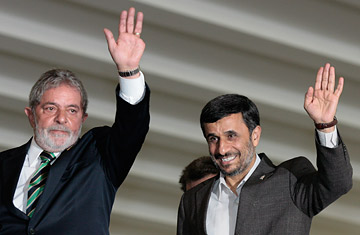
A swing through Latin America this week by President Mahmoud Ahmadinejad has prompted the Obama Administration and U.S. congressional leaders to signal their displeasure with the Iranian leader’s regional hosts. President Obama wrote to Brazil’s President Luiz Inácio Lula da Silva on the eve of the visit, reiterating the U.S. position on Iran’s nuclear program, and urging the Brazilian leader to back it. Washington’s pique is hardly surprising, since the visit comes at a moment when the U.S. is seeking to rally an international united front to coerce Iran into limiting its nuclear ambitions. But the scolding seems less justified to many observers, given that the promise of engagement was a central theme of President Obama’s own election campaign.
“There was Obama’s famous comment in the primaries when he was asked if he would sit down with the leaders of Iran, Cuba and North Korea without preconditions,” Dr. Timothy Power, a lecturer at Oxford University’s Centre for Brazilian Studies, recalled this week. “He said he would and Hillary [Clinton] jumped on him and said he was being naive. Well, Lula is just doing what Obama said he would do.”
(See the top 10 Ahmadinejad-isms.)
Lula enjoys considerable respect internationally, and the incorrigible talker believes problems can be resolved through dialogue. Before Ahmadinejad arrived, Lula pointedly declared, “It is important that someone sits down with Iran, talks with Iran and tries to establish a balance so we can get back to a kind of normality in the Middle East.”
Lula is desperate for Brazil to take on a more prominent role in world affairs, and would like nothing more than to bask in the prestige of playing peacemaker. The Brazilian leader gave Ahmadinejad the red-carpet treatment at their meeting Monday, telling him Brazil supports Iran’s nuclear program “for peaceful means.”
(See pictures of Pope Benedict XVI’s Visit to Brazil.)
Brazil’s interest in the Iran nuclear standoff is not based only on Lula’s desire to mediate global conflict, however; Brazil is an emerging nuclear-energy nation with two reactors in operation, a third near completion, and with plans to build between four and eight more nuclear power plants before 2030. It has also signed deals with France to build nuclear-powered submarines.
As such, Brazil already has the know-how and capacity to enrich uranium that could be used to create weapons, but refrains from doing so, not only because it would be expensive and hugely controversial, but also because Brazil’s constitution forbids it, says Guilherme Camargo, president of the Brazilian Nuclear Energy Association. But while Brazil and other developing-world nations that plan to use nuclear energy share the Western powers’ goal of ensuring that Iran does not produce nuclear weapons, they don’t support the position taken by the U.S. and its closest allies that Iran should forfeit the right to enrich uranium on its own soil even for peaceful purposes. Enrichment, under international supervision, to create reactor fuel is a right guaranteed to signatories of the Nuclear Non-Proliferation Treaty, and Brazil and other would-be nuclear-energy producers view attempts to limit the peaceful nuclear ambitions of a developing nation as an unfair attempt by the established nuclear powers to keep the new boys down.
Of course, Lula has plenty of differences with his guest from Iran. He has made it clear he supports a two-state solution to the Israeli-Palestinian conflict, has made a point of repudiating all acts of intolerance or terrorism, and has subtly criticized Ahmadinejad’s denial of the Holocaust and of homosexuality in Iran.
(Read “Brazil’s Lula: A Bridge to Latin America’s Left?”)
Those are messages that Ahmadinejad needs to hear from friends, notes Anoush Ehteshami, a professor at the Centre for Iranian Studies at Durham University in England. Since Iran does not appear to be listening to the West, especially not the United States, on the issue, the emergence of interlocutors who could help bridge the gap between the two sides ought to be welcomed. “Hearing [these messages] from Lula will be a little bit better received than if it were coming from U.S. President or E.U. leaders,” Ehteshami says.
How much influence Lula can have depends on how much he is willing to push the Iranian leader and how close a friendship they develop. “It all depends how much moral authority he feels he can impose on the relationship,” says Ehteshami. “He will have the instinct to play it down, as it is their first meeting. And Ahmadinejad hasn’t struck anybody as being someone who listens too much.”
Despite his country’s own nuclear interests, the Brazilian leader is unlikely to open nuclear ties with Tehran. “Lula is not crazy; he wouldn’t sign any accords with Iran on nuclear issues, not even for peaceful means,” said Camargo. “It’s not viable politically. But we have plants that can enrich uranium for peaceful means and we think that Iran should have that same right.” While that’s a view shared by many in the corridors of power in the West, it remains at odds with the formal position of the U.S., Britain and France. That puts Lula somewhere between the two sides — just where a mediator likes to be.
More Must-Reads From TIME
- The 100 Most Influential People of 2024
- How Far Trump Would Go
- Scenes From Pro-Palestinian Encampments Across U.S. Universities
- Saving Seconds Is Better Than Hours
- Why Your Breakfast Should Start with a Vegetable
- 6 Compliments That Land Every Time
- Welcome to the Golden Age of Ryan Gosling
- Want Weekly Recs on What to Watch, Read, and More? Sign Up for Worth Your Time
Contact us at letters@time.com